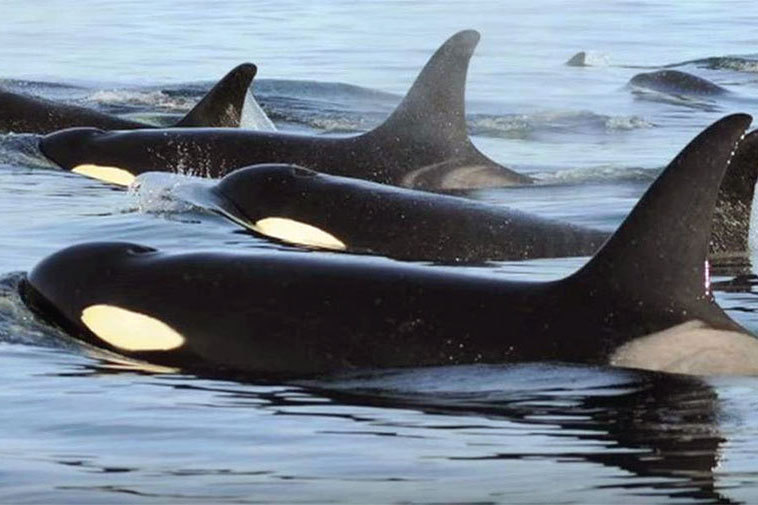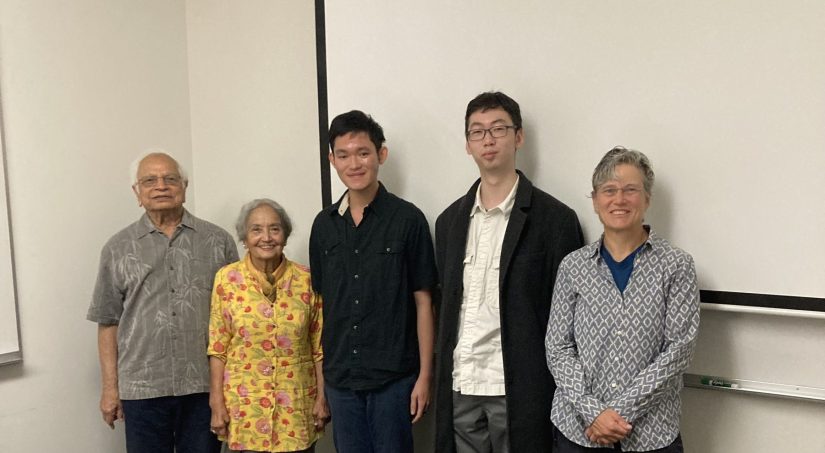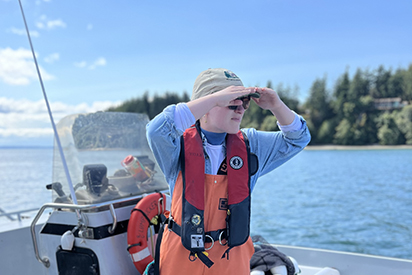Integrating mathematics with fishery science: another year of the Varanasi Internship
Now running for over a decade, the Varanasi Quantitative Undergraduate Summer Internship Program brings together math and fisheries sciences in a unique experience for students, who spend a summer working on research projects at NOAA Northwest Fisheries Science Center (NWFSC).
A collaborative program jointly funded by NOAA Fisheries, SAFS and the UW Department of Mathematics, and endowed by Usha and S. Rao Varanasi, students integrate mathematics with the science that informs fishery managers in real-world projects that have relevant and useful applications. 27 UW students majoring in quantitative and computer sciences have so far been able to learn new skills, contribute to research in quantitative and creative ways, and put their studies to practical use. The four 2023 summer interns worked on three different projects that gave them experience with mathematics and data science applied to fisheries problems.

Jiarui Yu, an Applied and Computational Mathematical Sciences (ACMS) Program major, applied state-of-the-art deep learning models on ocean remote sensing data on a project working to develop new methods for detecting coastal upwelling in the Indian Ocean with mentor Dr. Elizabeth “Eli” Holmes. “This internship allowed me to explore topics that I’m interested in, such as machine learning, which was fascinating.” As part of his internship, he participated in OceanHackWeek and led an international team that benchmarked machine-learning models for forecasting sea surface temperature.
Hannah Chiu, majoring in Statistics on the Data Science track, created a Shiny tool to present stock assessment prioritization data for West Coast groundfish. “This internship also stood out to me because the product could be used by resource managers immediately after development, and I wanted to contribute to a project that could create a positive impact through data.”
Being able to learn on the fly was one of the standout experiences for Hannah during the internship. Picking up new skills in a quick timeframe and applying them to her research project was something she describes as extremely valuable and essential for her future academic studies and professional career. She was also able to combine her interests in both marine biology and statistics during her internship: “This was perfect opportunity to work on a project that combined my past and current interests.”
For Jane Christopherson, an ESRM major and Quantitative Sciences minor (and local Seattleite), her internship allowed her to focus on a local species that has a lot of cultural and ecological significance: the Southern Resident killer whale. With her mentors, Jane explored how different killer whale morphometrics change with age, using a variety of nonlinear models to model body condition measurements from captive killer whales to understand how these measurements change over time in healthy, well-fed individuals.

Minh Phan, also in the ACMS Program, worked with mentor Dr. Eli Holmes and fellow intern Jiarui, on the data side of the Indian Ocean coastal upwelling project. This involved obtaining, cleaning, and synthesizing data into appropriate format to feed the machine learning models. “I wanted to work on projects that have real-world applications and Dr. Eli’s project was a perfect example. It helped reveal patterns on one of the most economically impactful natural phenomena, and the machine learning aspect is a novel technology that we wanted to test in the oceanography field.”

The usefulness of the internship program is a two-way street. Each year, the NWFSC benefits from collaborating with UW students majoring in math with an infusion of new ideas and methods, while mid-level scientists who act as mentors also have the opportunity to step into a managerial role.
One of the highlights of the internship for Hannah was working with her mentors Dr. Chantel Wetzel and Dr. Jason Cope (both SAFS alums). “While they gave me an idea of the general structure that they wanted the Shiny tool to have, I really appreciated being given the creative freedom to develop the tool in my own direction They were both super supportive throughout the whole process, and I am so grateful I had the opportunity to learn from them and work with them this summer.”

Complementing her knowledge of killer whale conservation with cetacean physiology and modeling from her mentors were some of the skills Jane was able to develop: “I enjoyed learning about killer whale monitoring efforts like aerial photogrammetry from Dr. Dawn Noren, plus learning different tips and tricks in RStudio and how to run complex nonlinear models with Dr. Nick Tolimieri”. Excitingly, Jane’s work over the summer with her mentors has led to a scientific paper in the works, another common result of undergrad-mentor pairings through the Varanasi Internship.
Minh concluded his internship by giving two lectures for the ITCOocean Hack2Week at the International Training Centre for Operational Oceanography in Hyderabad, India: “This was a proud and exciting moment for me, the first time presenting my work in front of a target audience I hadn’t been aware of before.” Gaining hands-on experience with heavy data, how to approach research and write research reports, and building confidence with Python were just some of the ways Minh enhanced valuable skills during his internship by working with his mentor.